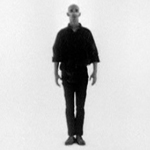 July 10, 1998
July 10, 1998
PI might be the most impactful of the summer of ’98 indies, at least in the sense that it introduced filmmakers who continue to be relevant 20 years later. It’s one of the old fashioned, scrappy, less-than-a-million dollar shoe-strings-and-boot-straps indie debuts, by which I mean it’s in black and white. Actually, 16mm high-contrast black-and-white reversal film. Vincent Gallo claims he fired Dick Pope as cinematographer of BUFFALO ’66 because reversal stock was too hard for him, but here’s director Darren Aronofsky and cinematographer Matthew Libatique, two Mr. Nobodies out of nowhere and they know how to use it. I like this kind of look, the grain dancing around, creating shadowy faces. It’s so opposite of how low budget movies usually look now that they’re digital.
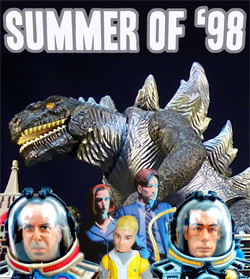 Co-writer Sean Gullette (TRAITORS) plays Max, a genius mathematician obsessed with his thesis that “everything around us can be represented and understood through numbers.” When he was a kid, he says, he stared into the sun, and this gave him an ability to notice numbers everywhere. He’s fixated on discovering patterns in long sequences, a hobby that first-time director Aronofsky has fun trying to make seem cinematic through fast editing, the cool guy electronic dance music of the era and pre-THE-MATRIX lo res on-screen strings of numbers. Also he figures out how to get some foot chases in there (Max thinks he’s being followed).
Co-writer Sean Gullette (TRAITORS) plays Max, a genius mathematician obsessed with his thesis that “everything around us can be represented and understood through numbers.” When he was a kid, he says, he stared into the sun, and this gave him an ability to notice numbers everywhere. He’s fixated on discovering patterns in long sequences, a hobby that first-time director Aronofsky has fun trying to make seem cinematic through fast editing, the cool guy electronic dance music of the era and pre-THE-MATRIX lo res on-screen strings of numbers. Also he figures out how to get some foot chases in there (Max thinks he’s being followed).
Max is a loner. He lives in a small, cluttered apartment in New York’s Chinatown, and his only friends seem to be Sol (Mark Margolis, DELTA FORCE 2), a retired math professor he visits to play Go (that Chinese game with the black and white stones on a wooden grid board) with and discuss that one time his studies brought him a mysterious 216 digit number he could never decode. You could argue that Max is also friends with the little girl (Kristyn Mae-Anne Lao) who likes to ask him math problems and see him calculate the answers off the top of his head, but he mostly seems impatient with her. He’s even ruder to the pretty Pakistani neighbor (Samia Shoaib, SUBURBIA) who brings him food and tries to look after him. Her obvious interest in him is a bigger mystery than the infinite digits of pi could ever be.
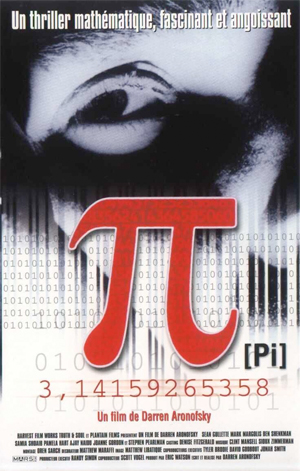 But she’s also not the only one he’s always trying to brush off. There’s also Marcy Dawson (Pamela Hart, NEXT STOP WONDERLAND), a phony-nice lady who keeps calling pushily trying to set up an unexplained appointment with him. And there’s Lenny (Ben Shenkman, ERASER), a guy who keeps trying to talk to him at a diner when he’s obviously trying to be left alone to circle stuff on the stock numbers in the paper. Lenny is so accurate – I’m very familiar with trying to do something (in my case writing a movie review like this in my notebook on a bus) when some stranger wants to start an inane conversation. It’s a funny thing, an unwinnable clash between two opposing personality types, and this guy is perfect at professing to understand Max wanting to be left alone, then sliding into “It’s just that…”
But she’s also not the only one he’s always trying to brush off. There’s also Marcy Dawson (Pamela Hart, NEXT STOP WONDERLAND), a phony-nice lady who keeps calling pushily trying to set up an unexplained appointment with him. And there’s Lenny (Ben Shenkman, ERASER), a guy who keeps trying to talk to him at a diner when he’s obviously trying to be left alone to circle stuff on the stock numbers in the paper. Lenny is so accurate – I’m very familiar with trying to do something (in my case writing a movie review like this in my notebook on a bus) when some stranger wants to start an inane conversation. It’s a funny thing, an unwinnable clash between two opposing personality types, and this guy is perfect at professing to understand Max wanting to be left alone, then sliding into “It’s just that…”
And he keeps bringing up Judaism (Max doesn’t practice) so there’s a sense of “have you heard the good word?” type salesmanship here, and nobody wants to deal with that. But I love the moment when Lenny explains his study of the Torah, how letters in Hebrew represent numbers that form math problems – and it’s so undeniably up Max’s alley that he reluctantly grumbles, “That’s kind of interesting.”
So he goes from trying to use math to predict the global economy to trying to use it to discover the name of God. As you do. Also he gets mixed up with the most intimidating group of Hasidic Jews I’ve seen in a movie.
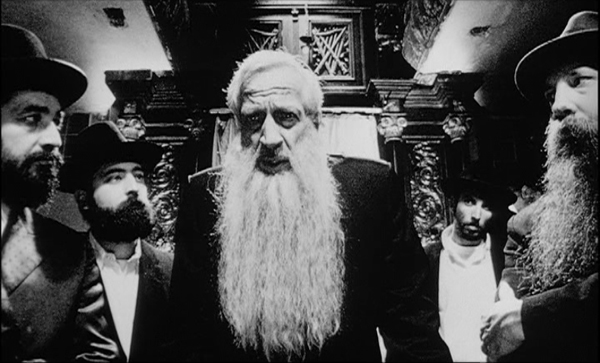
It’s one of those descent-into-madness type movies. He has headaches that keep getting worse. He keeps popping pills. Eventually he flips out and shaves his head. I should mention that he’s doing some weird experiment involving computer chips and wires, and for some reason ants keep crawling on his chip. Sometimes he finds slime. One time he tastes it.
ENDING SPOILERS: In the end he drills into his own brain – the thinking man’s Rambo self-surgery scene. It goes black and for half a second you believe it’s a fucked up nihilistic ending, until it continues and he’s alive and successfully removed the math part of his brain. I suppose one question it asks is if you could remove your biggest obsession could it improve your life? Of course it’s sad because math was his life, but honestly it seems like he’ll be happier now. Make real friends. Enjoy Pakistani food.
But I also see it as stopping your worry about having all the answers so you can enjoy the problem. What good is it to have numbers that represent the parts of life if you only ever experience them and not what they describe? I sometimes scare myself thinking about the question of existence – how could life be created by somebody? But also how could it not be? If there’s a beginning of time what was before time and If there’s not then what the hell does that mean? There’s not an answer to this that makes any sense and I figure that’s the limits of our thinking. Why are we conscious enough to be able to ask the question but never to understand the answer?
Poor Max was spending his whole life stuck stressing about shit like that, but with the stubborn certainty that he almost had the answer. What a horrible way to live.
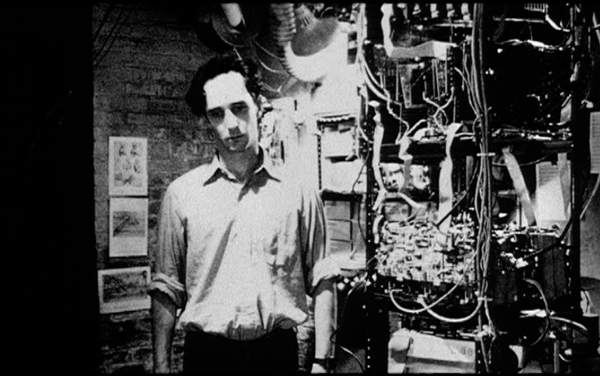
Even in this summer of notable indies, PI seems out of place, from another time when things were sloppier, more home made, more analog. It reminds me of black and white movies like ERASERHEAD and TETSUO THE IRON MAN. It’s a very different New York from MR. JEALOUSY or THE LAST DAYS OF DISCO – no rich people, no hip people. He’s an academic, but not a witty one. And I don’t think there are any white people in the movie who aren’t Jewish. And though it’s about what goes on in his head, the style is visceral, in your face, aggressive.
All of Aronofsky’s subsequent films would be much slicker, but coming from the same place. I especially kept thinking of mother!, which also starts out feeling like possibly the real world and then spiraling into a crazy fever dream with unexplained wounds, biological things growing on inanimate objects, religious and philosophical symbolism. Jennifer Lawrence found a wound growing in her floor and this guy finds a brain in a subway station and pokes it with a pen. There is plenty of PI in REQUIEM FOR A DREAM‘s closeups of eyes and drugs and it’s killer referigerator, and even in NOAH‘s creation sequence. I suppose the movie is very late ’90s in its music, which will go hand in hand with BLADE, THE MATRIX, RUN LOLA RUN, etc. Otherwise it’s kind of out of time. (Glad there’s no Sugar Ray and no X-Files references.)
I think Aronofsky’s body of work holds its own against other class of ’98 indie directors Don Roos, Noah Baumbach, Whit Stillman and Hal Hartley. I don’t know if I’d like REQUIEM FOR A DREAM anymore, but I liked THE FOUNTAIN and NOAH and mother! and I loved THE WRESTLER and BLACK SWAN. He’s unusual in that he’s grown in budget and scope but has continued to stay on the arthouse side of things his whole career. He’s never gone into television or any sort of franchise filmmaking, but he did develop a Batman movie before Nolan and THE WOLVERINE before Mangold, so it’s not for lack of trying.
Debuting cinematographer Libatique also went on to an impressive body of work that includes most of Aronofsky’s films plus JOSIE AND THE PUSSYCATS, INSIDE MAN, IRON MAN, STRAIGHT OUTTA COMPTON, CHI-RAQ and more. And it’s not surprising, because the guy behind the camera here is clearly excited and inventive and hungry, bringing energy to this you-would-think inherently static subject matter. There are lots of cool shots spinning around his head or attached in front of his face as he walks or vibrating to represent the chaos in his brain, and they never feel spastic or dizzying to me.
And composer Clint Mansell was from the band Pop Will Eat Itself, but this was his film debut. He too stuck with Aronofsky, but also did DOOM, SMOKIN’ ACES, MOON, FASTER, GHOST IN THE SHELL and many others.


























July 25th, 2018 at 11:15 am
I love this movie. After I watched it I would wake up for days (weeks?) afterward from those incomprehensible dreams where, while you’re in it, you’re sure you’re unscrambling codes and solving riddles. Number puzzles, of course. I’ve been afraid to rewatch the movie ever since because, well, those dreams suck. But the movie was amazing, and it made me an Aranofsky fan for life.